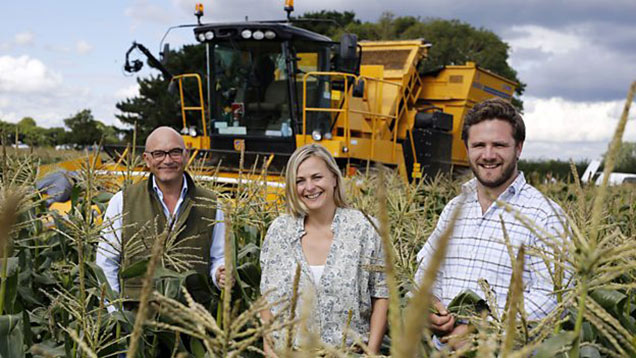BBC improves rural coverage by tackling ‘hard-core’ topics
 Harvest presenters Gregg Wallace, Philippa Forrester and James Manning © BBC/Carl Pendle
Harvest presenters Gregg Wallace, Philippa Forrester and James Manning © BBC/Carl Pendle The BBC has taken significant steps to improve its coverage of rural issues by tackling “hard-core” agricultural and environmental topics, according to a new report by the corporation’s trustees.
An independent review of the BBC’s rural affairs coverage published last year found that programmes such as Countryfile were “too squeamish and simplistic” in their coverage of rural issues.
In particular, the report found the BBC’s coverage of bovine TB included “too many fluffy badgers”, which was felt to skew the argument over the badger cull in favour of the anti-cull lobby.
See also: Ten key findings of the BBC rural review
The report found the BBC could do better by “reflecting a broader perspective on rural lives, rural issues and the part the countryside plays in national life”.
A progress update of the BBC’s coverage of rural issues found that the BBC had raised its game on rural issues in recent months by tackling “hard-core” subjects, such as rural crime, campylobacter in chickens and the milk price crisis.
It said: “Countryfile makes a particular feature of covering specialist rural stories, including hard-core agricultural and environmental subjects.”
The report (PDF), published on Tuesday (27 October), shows that since 2014, the BBC has:
- Improved links and collaboration between rural affairs and specialist journalists such as the Radio 4 Farming Today team and the wider BBC, leading to stories on network news programmes including BBC Breakfast, The One Show and the Today programme about farming technology, rural housing, the EU farm subsidy payments system, GM crops and pesticide legislation.
- Commissioned a range of programmes with a rural focus on BBC Two, including Lambing Live, about life as a sheep farmer in Scotland, and Harvest, a behind-the-scenes look at British farming.
- On Countryfile, included a range of harder-hitting stories such as rural crime, the milk price crisis, and the effect of National Park budget cuts. This followed concerns from some who took part in the 2014 review that there could be a tendency to idealise rural life.
- Given three English regions reporters specific responsibility to provide rural affairs stories to network news, which has led to reports on network programmes such as BBC Breakfast about the milk price crisis, starling murmurations and the recovery in barn owl numbers.
BBC trustee and chairman of the trust’s editorial standards committee, Richard Ayre, said: “The BBC has shown real commitment to improving its coverage of rural lives, communities and issues on network TV over the past year in response to our report, which has made a noticeable difference on-screen and on-air.
“One of the big challenges both now and in the next charter period for the BBC is continuing to reflect the UK in all its diversity and we’ll look to them to continue the work they have started.”
